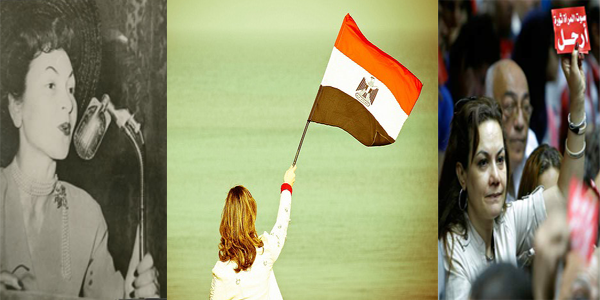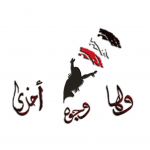A tribute to 5 Remarkable women shaped the history of liberalization movement in Egypt
History is shaped by great leaders who are living for greater causes than their own selves, showing an unwavering will and an amazing determination to make society a better place for both sexes to survive and thrive. This article proves that the Egyptian feminist waves started very early in 1892, if not before with the efforts of ” Hend Nofal” who released the 1st feminist Magazine in the Middle East , followed by ”Qasem Amin” and “Malak Hefny” who initially charted the Arab feminist movement.
This article sheds the light on 5 female figures from various generations in the history of the feminist thought in Egypt; each making her root cause to strive for women’s liberation, although each leader’s cause and program varied according to the flow chord of events and circumstances unique to her own timing, such as calling for right of women to education in the 2nd portion of the 20th century, passing through women’s right to vote in mid of 1900s and finally calling for women’s right to elect for presidency in the new millennium.
The first generation in the fight for women’s rights
Malak Hefny Nassef: The first Arab woman to receive a primary school certificate
Though living shortly for only 32 years, “Malak Hefny Nassef” was a well-known Egyptian writer and leading feminist, born in Cairo in 1886 and died in 1918.
She is a prominent figure in the history of the feminist thought, for being the first Arab woman to ever receive primary education, choosing to become a teacher other than the normal role assigned for women by then, which is to become inferior to “men’s arrogance and pride”, as she stated.
“Malak” made her prime cause to fight for women’s educational rights through writing articles on her own, under the penname of “the Researcher of the desert”, a name which she assumed for herself after settling in Al Fayoum with her elite husband.
She published many articles of edification in the press, particularly “AI-Garida”, which she later collected in her book “Feminist Affairs” and having embarked on a second book “Women’s Rights” which she died before its completion; all which discussed women’s struggles in the early years of the twentieth century and its resolutions for a better society.
At her works, “Malak”, predated the famous quote of Simone De Bouvoire, when the latter said in mid 1940s that “Women are made women by men”. Actually, Malak stated the same concept in different words by mentioning that “Women are not inferior intellectually to men; women after long centuries of enslavement by men, had their minds rusted and bodies weakened for having norms that are rooted in fallacy.”
She further asserts that, women prove to be capable of what men can do as well from her own experience of “the female peasants working at her family farm.”
As a way of offering solution to women suffrage in Egypt, she presented to the Egyptian Legislative Assembly a modest ten ways they might act to improve the condition of women, in 1911; all were rejected by the Assembly dominated by men at that time.
The most prominent among these ways was to make primary education obligatory, and ban marriage and divorce except by a verdict from judge.
The second generation in the fight for women’s rights
Hoda Shaarawi: The woman of the “Firsts” and the catalyst of the modern dress code
Deeply engraved by the segregated harem system, and the inequalities she received at her private life for preferring her male sibling, and forcing her to early marriage, Hoda Shaarawi encouraged women to take a lead in the political life combating the notion that “women are created for men’s pleasure and in need of protection”, and establishing a school to teach women academia rather than midwifery skills.
She is also recognized for being the first woman in Egypt to take off her face veil, after bravely stepping off the train upon her return from Rome conference, and removing it in front of the crowd in public, leaving them shocked yet cheering in applause because at this time veil was a matter of obligation, rather than a choice.
Being the engine behind women’s zeal, in 1923, she founded the Egyptian Feminist Union, submitting two reports to the prime minister demanding an end to polygamy and the injustice that women are subjected to because of the “obedience law,” as well as raising the age of Child custody in the case of divorce.
In fact, “Hoda” is a central figure in Egypt feminist history because she is “the first” feminist establishing many organization serving feminist purposes; in 1908, she founded the first philanthropic society run by Egyptian women arguing that such social service projects run by women; “would widen women’s horizons, and help them acquire practical knowledge and direct their focus outwards.”
On the international level, she represented Egypt at women’s conferences and congresses around the world advocating for peace and disarmament, for being the vice president of the International Alliance of Women for Suffrage and Equal Citizenship 1934, and the founding president of the Arab Feminist Union in 1945. Furthermore, she was instrumental in convening the first Arab Feminist Conference in 1944, and in 1945 in forming the Arab Feminist Union, which called for solidarity with the Arabs of Palestine, proposing the internationalizing-concept of the Suez Canal.
The third generation in the fight for women’s rights
Dorrya Shafiq: a woman who bravely twittered outside the flock
If currently women have the right to vote in Egypt, it is because of “Dorrya’s” efforts, because women were granted that right in 1954 constitution, though with a prerequisite of being literate.
Unlike, “Malak” who blamed men for objectifying women,”Dorya Shafiq” urged women themselves to deliver their own freedom rather than awaiting the society to awaken, since a woman dictates her freedom. “Dorrya” prime cause was to raise the consciousness of the middle-class university students and most importantly to provide economic opportunities for lower-class urban women; a cause which was never addressed by her prior feminists in as early as 1940s, stating that she will fight “till the last blood of her soul in the era of the invisible prison which is the most oppressive of them all”
And Because birds who twitter outside the flock suffer the most, since conformity is always the price of any societal membership, “Dorya”, had the most ill-fate of them all, for scaling her struggle in the most explosive periods of social and political transformation in Egypt, that of “Abdul Nasser”. Her two brave hunger strikes against the populist regime of Gamal Abdul Nasser, to achieve the women demands, placed her under house arrest for life, including painful psychological assassinations tactics, such as folding her magazines, banning her name from the press and from all texts by which very few have survived and naming her “the only man of Egypt”, the “perfumed leader,” a “danger to the Muslim nation,” and a “traitor to the revolution,” leading her to live in complete seclusion.
During the burst of the feminist movements in Egypt in the 1940s, she established “the daughters of the Nile” union in 1948 to promote emancipation and combat illiteracy by establishing targeted programs for that cause.
She was the first woman at her time to conduct a peaceful demonstration to the parliament to amend the articles which enshrine societal inequality, such as the law of polygamy and to introduce the law of divorce; a matter which made the journalists of that time name her “the woman of explosions”.
Amina Al Saeed: The first Arab woman magazine editor to a magazine not owned by her or another woman
At the age of only 14, “Amina” joined the wing of the youth in the Egyptian feminist union, named by the press as “the woman who knows no fear”.
Also, she is credited in history, for being the Editor in Chief of the first women’s magazine after 1952 revolution “Hawaa” in 1954, and for being amongst the earliest full time female journalists in Egypt, such as being a columnist of “Ask me”, known as the arena of political debate during Nasser’s era, alongside, working in “Al Musawer” newspaper, by which she was successfully promoted to as its editor in 1973, and further chairing the magazine’s publishing group from 1976 till 1985, becoming more vigorous in her defense of women’s rights, against the beginning of the Islamic Fundamentalist tide in 1970s.
Furthermore, “Amina”, is known to be the first paid woman to work for a mainstream publishing house, “Dar al-Hilal” in 1940s, becoming the vice president of the Board of the Press Syndicate in 1956.
She is described by the Independent magazine to be “the last of a generation of feminists who picked up the torch from their 19th-century forebears as political dissidents”.
“If contemporary Arab women are honest,” she once wrote, “they will recognize that they have not added anything to the efforts of those who have gone before and that they have not been part of any effort worth mentioning in advancing the feminist cause.”
Bothaina Kamel: The first woman to run for presidency but fell short for ballot!
If women at the earlier waves of the feminist struggle in Egypt, struggled for equality in work and education, the famous broadcaster “Bothaina” would be credited for being the first woman in modern Egyptian history tried to run for the country’s presidency, in 2012.
Stating of her candidacy, “As by putting myself forward I am making this the right of a woman to be a concrete reality, and that alters expectations, .as women, have never really had a moment of empowerment.”
Nevertheless, she did not secure enough recommendations, and she was further preyed to sustained attacks from many directions.
In fact, such brutal course of actions can be explained within the context of the patriarchal society she is born into, known for its male dominated values and traditional gender role norms.
As early as in 2005, she has been known to be a rigorous pro-democracy activist, for being a part of “kefaya” movement, the seedbed of the anti-regime movements, like her Campaign “shayfenkom, until in 2011 revolution, her bombastic tone, “victor or martyr” stood out from the heart of the Egyptian streets, declaring that Mubarak’s “arrogance and disrespect for the Egyptians all around him”, acted as a nail in the regime’s coffin.
It is noteworthy to mention that “Bothaina” is a well-known broadcaster hosted a show called “Please Understand Me” which tackled societal and political problems, leading her to encounter official resistance, and having her Radio show “night Confessions” being cancelled after outcries from religious conservatives.
However, despite all the problems she encountered she stated about women, her words “that we will have to rally and amass people to continue campaigning for our rights” keep resonating the voice of the first woman to run for presidency in the Egyptian history.












 by
by